FW Awards: Meet the 2025 Arable Adviser of the year finalists
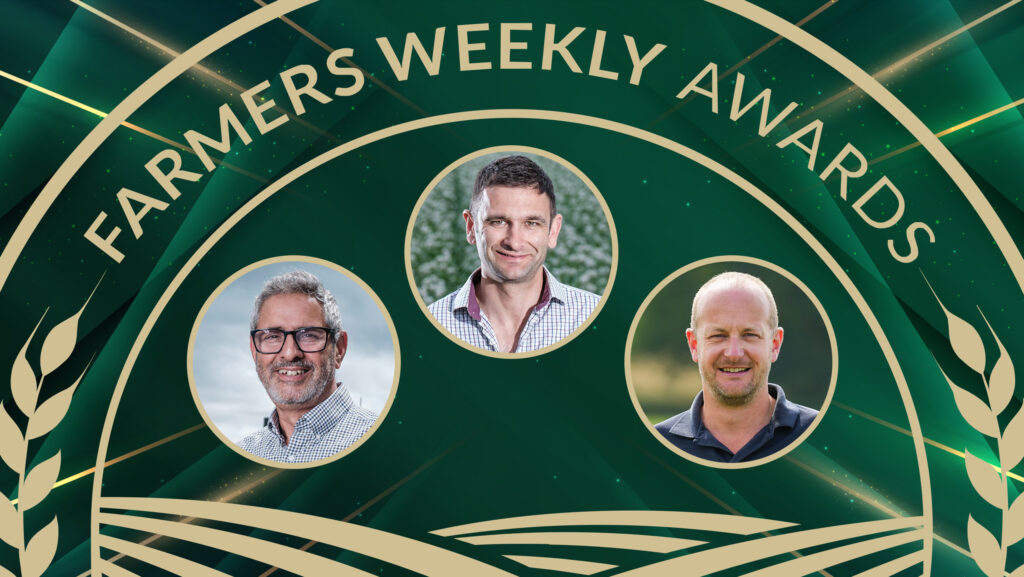 © Jim Varney/Emily Fleur
© Jim Varney/Emily Fleur This year’s finalists bring a diverse mix of strengths – from hands-on potato expertise and regenerative precision farming to data-led strategies for building farm resilience.
The judges
- Edward Vipond Suffolk farm manager Edward was crowned FW Farmer of the Year in 2021 and is the independent judge in the arable adviser category.
- Richard Tresidder Last year’s winner, Agrovista agronomist Richard is known for his hard work, adaptability and high level of service in Cornwall.
- Philip Case Farmers Weekly chief reporter and former arable reporter, Philip has been judging this category for the past four years.
See also: FW Awards 2025: Meet the finalists
John Sarup, Spud Agronomy & Consultancy, Driffield, Yorkshire
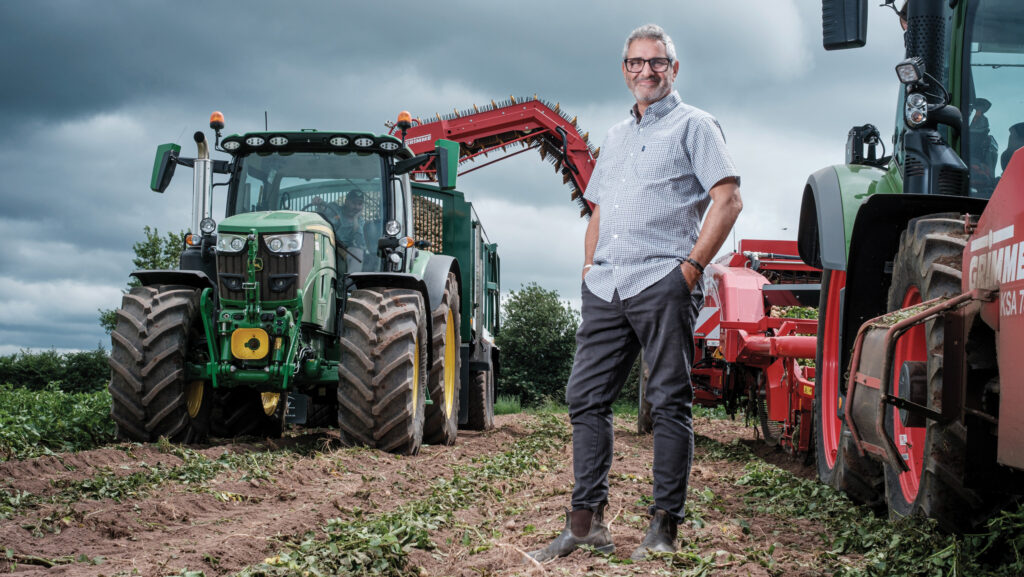
John Sarup © Jim Varney
When John Sarup first drove through the gates of Edward Shaw’s Cheshire farm in 2003, he was greeted by a mixed operation of 170 dairy cows and just 40ha of potatoes.
Today, the cows are long gone at Red Beech Farm in Tarporley and the business has expanded to 365ha of potatoes.
It’s a transformation Edward says wouldn’t have been possible without John’s support.
“John has led us into things we wouldn’t have done otherwise,” says Edward, owner of E&SR Shaw, which now grows potatoes for various companies, of which 60ha of Accord is grown for chip shops across the North West with the remaining area grown for Mercian and McCain.
“We wouldn’t be where we are without him. He’s part of the team – more than that, part of the family.”
John, who is based near Driffield, in East Yorkshire, founded Spud Agronomy & Consultancy in 2012 and enlisted fellow potato agronomist Rob Blades two years later after considerable expansion of the business.
They now advise on about 5,000ha of potato production, mainly across northern England.
Technical mastery
Before launching his company, John worked as an agronomist for SAC Consulting alongside Dr Stuart Wale for almost a decade.
He also enjoyed spells working at B&C Farming, near Norwich, and Velcourt in East Suffolk.
This experience has underpinned his understanding of agronomy and the advice he gives. The practical knowledge matters, especially with potatoes, John says.
“They demand far more attention to detail than cereals. The financial swings are bigger.
“You can lose a lot or gain a lot depending on your decisions. My job is to make sure it’s the right decision.”
His advice blends innovation with pragmatism, whether that’s fertiliser strategies
tailored to individuals fields and varieties.
John encourages the use of innovative foliar feeds and in-furrow treatments.
Digitalisation is central, with tools such as Telus Farm Management syncing with processors’ systems to streamline nutrition planning and spray records.
Working with Mercian, John is looking at potato trials into reducing carbon footprint and carbon dioxide emissions.
He is also experimenting with cover crops with a keen eye on reducing carbon footprint soil-borne pest disease levels.
Details focused
Edward says John’s attention to detail – from optimal planting dates to refining fertiliser choice and cultivations – is delivering great results.
“We won’t go any bigger. If we do, we’ll lose the attention to detail – and that’s what makes it all work,” he adds.
John also founded the Association of Independent Potato Consultants (AIPC), a group of 18 like-minded agronomists who all deliver independent, specialist advice on potatoes.
“It’s peer-to-peer learning at its best,” he says.
“We’ve got Zoom meetings, a WhatsApp group, and hold three meet-ups a year.”
Future focus
John is mindful of the next generation.“I’m 64. I’ve no plans to retire and succession is also at the back of my mind. Luckily, my youngest son, Joel, also works in the potato industry.”
In a sector facing climate pressure, rising costs, and chemical clampdowns, John stresses the importance of clear, independent advice.
“Agronomy shouldn’t end with the spray programme. And it certainly shouldn’t start with a sales pitch. My main goal is always to make the crop – and the grower – succeed.”
After 40 years, John still gets a buzz in the field. “It’s not a job,” he says. “It’s who I am.”
Fact file
- Founder of Spud Agronomy & Consultancy, offering expert, hands-on potato agronomy and consultancy advice across 5,000ha
- Long-term success story with Cheshire potato growers E&SR Shaw
- Field trials on nutrient use efficiency and cover crops
- Founder of the AIPC
- Practical, impartial support that extends beyond chemistry – from planning to delivery to the customer
The numbers
- 16 Age started out milking cows
- 40 Years working in the farming industry
- 13 Years as head of Spud Agronomy & Consultancy
- 30 Number of clients located across the UK and Ireland
- 30 Percentage reduction goal of carbon dioxide emissions by 2030
The judges liked
- Amazing attention to detail
- His enthusiasm – his phone is always “on”
- Friendly relationships with clients
- Innovative approach to the potato crop, trialling new growing programmes
- Gets the basics right – making sure cultivation and seed selection are correct
What the judges say
John’s infectious enthusiasm and incredible technical knowledge shine through. He goes above and beyond, is regarded as family by clients, and consistently delivers outstanding results.
David Stead, Hutchinsons, Ripon, North Yorkshire
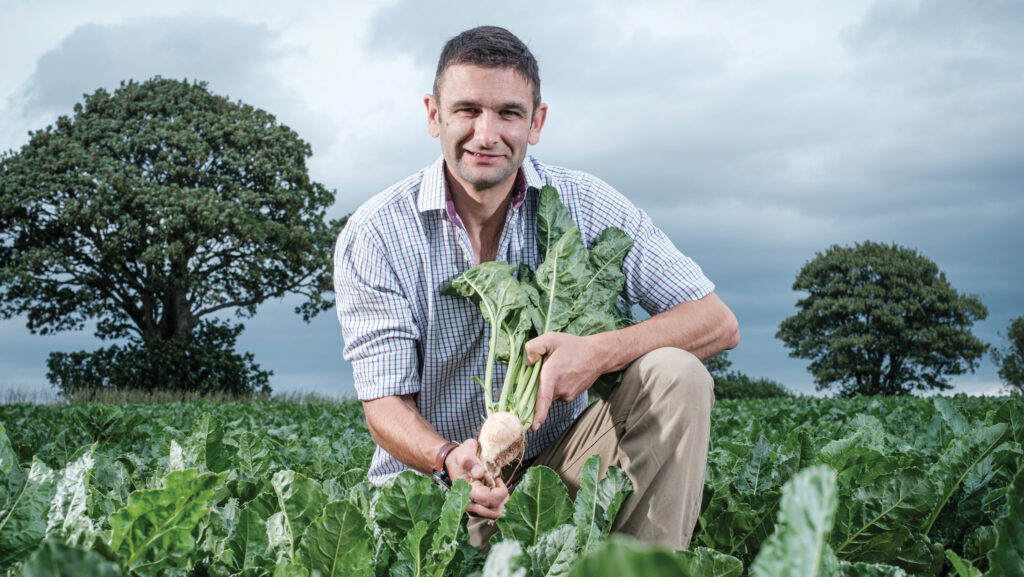
Dave Stead © Jim Varney
When JC Lister Farms embarked on a pioneering journey towards regen agriculture at Newby Hall Farms, they knew they needed more than just conventional advice.
That’s where respected agronomist David Stead, Hutchinsons regional director for the north of England, stepped in.
His work with the farming business exemplifies how practical, science-backed agronomy can support both environmental stewardship and business resilience.
Regen journey
Newby Hall Farms, in Ripon, runs a diverse rotation of potatoes, sugar beet and cereals, alongside 2,500 sows and 200 pedigree Aberdeen Angus cattle.
“We’re just beginning our journey into regenerative farming,” says George Swiers, farm manager.
“We’ve gone from a full plough, intensively farmed system to a Mzuri strip-till drill. David came in just as we were making the transition and he has ensured we have progressed smoothly.”
David’s input was crucial in redesigning the farm’s rotation from a tight five-year plan into a longer, more resilient nine-year cycle, integrating livestock and cover crops.
“We’re not completely resetting the soil. We’re just getting there now to the point where we think we can keep everyone on the tramlines,” says George.
This approach echoes David’s philosophy to balance environmental goals alongside profitable farming.
“The whole thing is only sustainable if it’s financially viable,” says David.
“I’m ever conscious as an agronomist that I’m no good without profitable customers. It’s a case of evolution, not revolution, making sure we don’t fall into any traps where we’re worse off.”
Part of the success at JC Lister Farms lies in David’s holistic approach, combining precision technology with deep industry knowledge and a farmer’s practical mindset.
George recalls how switching to Hutchinsons’ Omnia Digital Farming platform for soil scanning and variable-rate input applications has transformed their approach to precision farming.
“It’s how to get that 10% extra out of your land, isn’t it? Omnia is a really useful tool. I can record everything on my phone now.”
Potatoes specialist
David’s expertise is especially valued on the farm’s potato crops, due to their scale, complexity, and commercial significance.
“We grow about 200ha of potatoes every year, for crispers and McCain’s,” says George. “David is very good at getting the quality right – the fazor timing, dry matter testing, variety selection and managing potato cyst nematode.”
On cereals and sugar beet agronomy, David’s advice on weed management, especially tackling grassweeds without relying excessively on chemicals, has also been vital.
“We are only stacking autumn residuals for brome control. But if we lose glyphosate, life would become very challenging,” David says.
David places a strong priority on meticulous planning and client care.
George notes: “He comes round every Friday. We plan the following week. He’ll see what’s in the store and efficiently plan crop production products to the nearest can.”
Coaching role
Mentoring younger Hutchinsons agronomists is a true passion for David, who splits his time weekly between two days of management and three days in the field.
“I’m proud to have been involved in coaching eight young agronomists who are now thriving in their own right,” he says.
“Coming from a family farm, I always wanted to be an agronomist. What I enjoy most is turning science into practical advice.”
Fact file
- Excellent practical farming knowledge, raised on a family farm
- Field walked agronomy service with a focus on potatoes, cereals and diverse crop management
- Skilled in precision agriculture, seed, fertiliser and crop nutrition
- Collaborative use of specialists/consultants to support soil health and agri-environmental schemes
- Mentors and coaches young agronomists; leads a strong regional team
The numbers
- 2010 Graduated from Harper Adams University
- 15 Years working as an agronomist at Hutchinsons
- 5,000 Hectares serviced annually across Yorkshire
- 800 Hectares of potatoes overseen
- 8 Agronomists mentored to date
The judges liked
- Progressive agronomist
- Demonstrates exceptional dedication and passion for role
- Undertaken mentoring role for eight junior agronomists
- Business growth by reputation
- ‘The little things’ that make the difference approach
What the judges say
David’s can-do attitude and drive for results is clear to see. He works closely with growers, communicates consistently, and leverages his regional expertise to deliver outstanding results for clients.
Will Vaughan-France, Niab, Bridgwater, Somerset
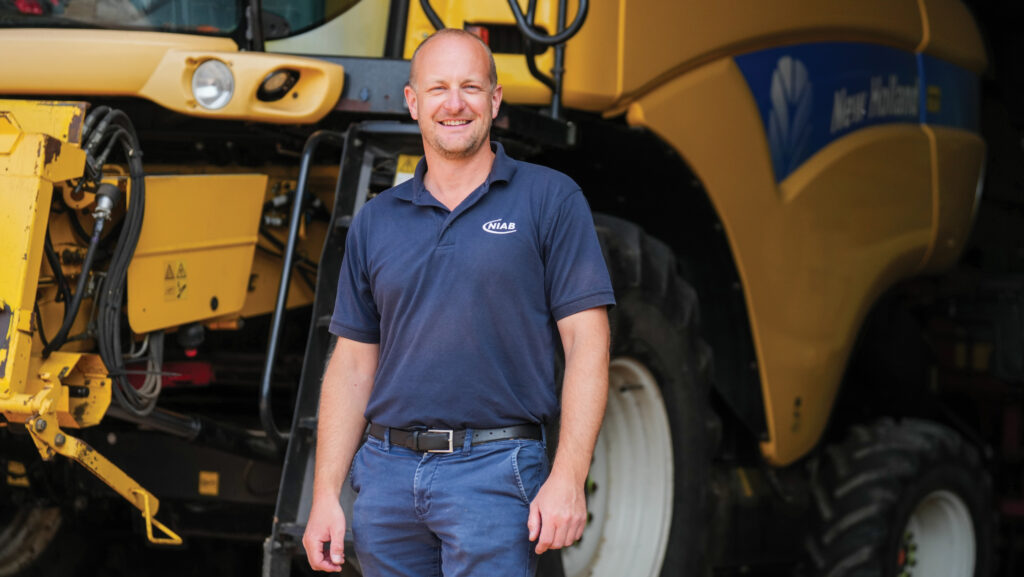
Will Vaughan © Emily Fleur
As government support dwindles and weather extremes bite, the need for practical, forward-thinking agronomy advice has never been more critical.
In the South West, Niab regional agronomist Will Vaughan-France is helping farmers build resilient, profitable systems grounded in technical insight and lived experience.
Now three and a half years into his Niab role, Will has organically grown its agronomy membership in the region – a direct result, he says, of “positive client experience and going the extra mile to deliver value”.
His work splits into two key areas: delivering Niab’s strategic agronomy service through field meetings and technical content, and providing hands-on consultancy advice to farm businesses.
Holistic approach
“It’s about much more than crop walking,” Will says. “We’re supporting decision-making across crop agronomy, soil management, business planning and risk management.”
Will leads Niab’s South West member meetings, blending science, strategy and practical farming experience.
Attendance has doubled under his watch, with topics spanning from crop economics and input strategies to tyre pressures and drainage.
“We’re not just steering fungicide plans. It’s about equipping farms to withstand weather volatility and stay profitable through economic challenges,” he says.
Will also runs his own 100ha arable unit near Taunton, where he can test new ideas.
“This enables me to offer clients more practical insights alongside technical advice,” he says.
That connection resonates with his Niab agronomy client and member Matthew Bere, who runs Fordgate Farm, a 120ha arable farm near Bridgwater.
“Will sees what works practically, and he’s always good on the detail – from resistance strategies to sprayer nozzle choices,” says Matthew.
Results-driven
For Matthew, the results are clear.
“Will helped us adapt. He changed our herbicide strategy, flagged yellow rust in wheat early, found aphids in peas I didn’t spot, and he even gets the sprayer mixes spot-on – down to the last can.”
Will is increasingly focused on cost-efficiency and long-term planning. “We’re putting economic context behind every agronomy decision,” he explains.
“It’s not just ‘what’s cheaper’, but what actually leads to greater profit.”
He is also helping his clients adjust cultivation and variety strategies to balance risk and reward.
“It’s about asking: what are your limiting factors? What’s your exposure to downside risks like establishment failure or lodging? And where are your safe bets?”
With fertiliser being a major component of production costs, he is exploring with his clients alternative strategies and tools which can help them maximise nutrient use efficiency.
“We’re always looking for better ways to balance cost and output. That means measuring, not guessing,” he says.
Diverse background
Will’s farming perspective is shaped by previous roles at Monsanto, Dyson Farming, and Bidwells, as well as completing the Worshipful Company of Farmers’ Challenge of Rural Leadership.
He also draws from networks such as Niab’s science team, the Association of Independent Crop Consultants (AICC), and farming contacts across the UK.
Will believes the arable sector must adapt by being commercially focused while aware of its responsibility to sustainable use of resources, protection of the environment and its role in society.
His expertise is future-proofing his clients’ businesses. As Matthew puts it: “He’s incredibly knowledgeable, very practical – and best of all, he really cares.”
Fact file
- Full crop walking agronomy service
- Farm business consultancy services
- Sustainable Farming Incentive planning (particularly the agronomic implications)
- Niab membership service delivery with regular field meetings, telephone technical support and content
- Strategy meetings cover agronomy, soil management and business economics for the Niab membership
The numbers
- 13 Age when he first became interested in agronomy
- 19 Years in the farming industry
- 3 Counties covered – Cornwall, Devon and Somerset – as well as working with colleagues nationally
- 14 Group meetings delivered to the Niab membership in the South West each year
- 25 Growth percentage in Niab regional membership since 2022
The judges liked
- Blends scientific insight with real-world farming experience
- All-encompassing advice – not majoring on solutions out of a can
- Instrumental in growing Niab membership in his area
- Runs seasonal farm workshops focusing on relevant topics
What the judges say
Will combines deep agricultural knowledge, diverse career experience, and a Reading University background. His exemplary commitment to clients shines through, delivering the full package with a positive attitude.
A word from our sponsor
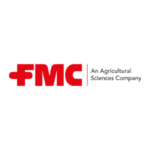
“FMC wishes all the Arable Adviser of the Year 2025 nominees the very best of luck – your dedication drives the industry forward.”
Geoffrey Bastard, marketing and plant health leader for FMC in the UK and Ireland
